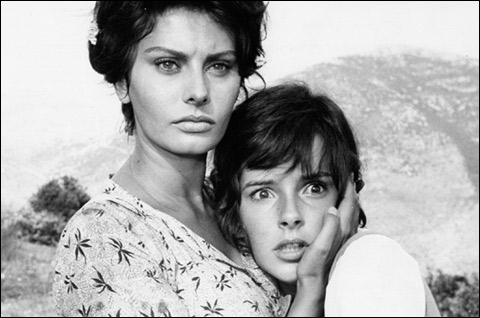
TWO WOMEN: Sophia Loren won the Best Actress Oscar for this one. |
Vittorio De Sica, the subject of a major retrospective at the Harvard Film Archive, "Vittorio De Sica — Neo-Realism, Melodrama, Fantasy," was a movie star in Italy before he became a filmmaker. And since he'd made his reputation as a handsome charmer in romantic comedies — and since his first four pictures as a director continued the trend — he must have seemed the least likely figure to join with Roberto Rossellini in bringing his country's film industry to the attention of the world with the development of Italian Neo-Realism. This movement dramatized the ills of late–World War II and post-war Italy. De Sica's masterpieces in this style — Shoeshine (1946), The Bicycle Thieves (1949), and Umberto D. (1952) — combined Stendhal-like social realism with Chekhovian lyricism, a mixture that no one since has managed to pull off. (Every year brings more Neo-Realist films from France and Italy, but they're noticeably lacking in poetry.)
Rossellini made the first official Neo-Realist movie, Open City, in 1944, but two years earlier, De Sica had departed from his penchant for light entertainments with THE CHILDREN ARE WATCHING US (June 6 at 7 pm). It was his earliest collaboration with the screenwriter Cesare Zavattini, whose sensibility shaped Shoeshine, The Bicycle Thieves, and Umberto D. as much as De Sica's. You might call The Children Are Watching Us proto-Neo-Realist. It introduces the great twin themes of Shoeshine: the corruption of innocence and the destruction of children at the hands of indifferent or self-interested adults. None of the grown-ups in these films is a villain — De Sica's vision of humanity transcends the notion of good and evil people, even when he works in the genre of social-problem pictures. In The Children Are Watching Us, the disruption of a family by a weak-willed, philandering woman and her desperate husband makes their sensitive son, Pricò, who ends up in a boarding school, sad, feverish, and eventually miserable. In SHOESHINE (June 5 at 7 pm; June 6 at 9 pm), Giuseppe and Pasquale, two shoeshine boys living in poverty in Rome who share a poignant friendship, are sent to a correctional facility for their ancillary role in the selling of stolen goods — but Giuseppe's thieving brother and his accomplice the fence go free because the boys refuse to reveal their identity. At the facility, the boys are separated, and the authorities casually turn them against each other.
These films are tragedies, and so are THE BICYCLE THIEVES (June 13 at 7 pm) and UMBERTO D. (June 12 at 7 pm). The element that De Sica and Zavattini added is the sense of the economic and social realities of the time and place where the films are set. Shoeshine begins with the two boys riding horses. We think we're going to see a conventional coming-of-age movie about privileged kids; then they dismount, and we learn that they haven't much money, and that the little they've acquired they earned selling shoeshines on the street corner. (De Sica contrasts them with the obviously well-heeled couple who arrive in a car for the next horse ride.) Yet they want what all kids want, and the horse on which we see them represents it. In the grim world of the movie, the horse functions as the dream that keeps the boys going, a simple dream we know they'll be denied just as surely as we know George and Lennie will never get that farm in the Depression classic Of Mice and Men. Antonio, the protagonist of The Bicycle Thieves, has an even more basic desire: any employment that will keep his wife and little boy Bruno solvent. He gets it — a job plastering billboards — but it requires a bicycle so he can get around the city. His wife sells their wedding sheets so he can buy one, but on his first day, it's stolen.